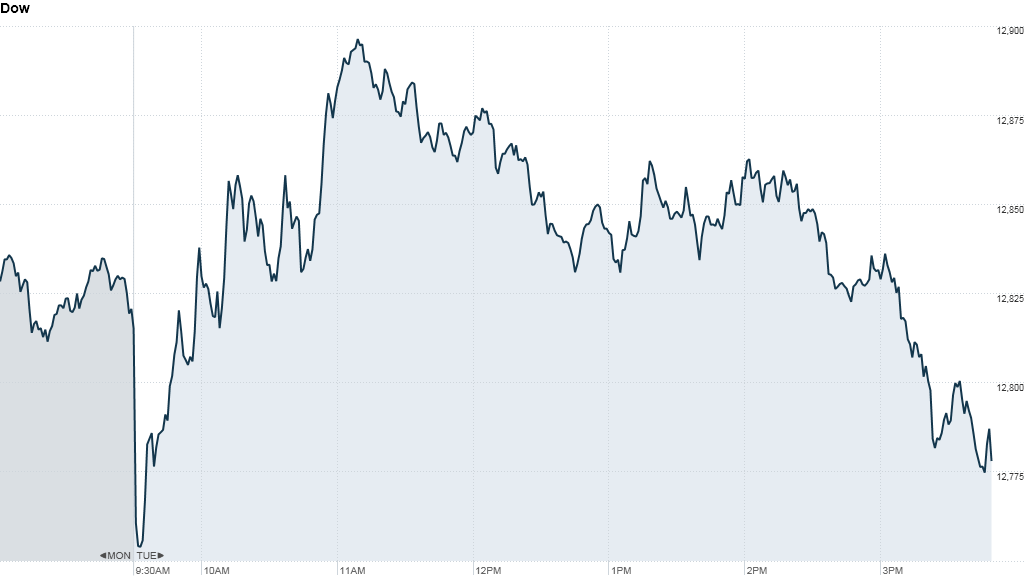U.S. stocks ended modestly lower Tuesday, as investors question whether lawmakers will cut a deal to avoid the fiscal cliff.
The Dow Jones industrial average and the S&P 500 both lost about 0.4%, while the Nasdaq ended 0.7% lower. Stocks were mostly wafting around the breakeven line for much of the day.
Tech shares, led by Microsoft (MSFT), Intel (INTC), Baidu (BIDU) and Reserch in Motion (RIMM), paced the selling into the close.
After the closing bell, Cisco Systems (CSCO) reported quarterly profits and sales data that beat expectations.
Overall, investors remain unwilling to place any big bets while lawmakers try to strike a deal that would prevent the onset of sharp spending cuts and tax increases in January. President Obama plans to meet with union leaders on Tuesday, a number of business leaders on Wednesday and congressional leaders on Friday.
Stocks sold off sharply last week, as investors worried the government would be unable to reach a consensus, potentially triggering a recession.
Related: Wall Street bracing for capital gains tax hikes
The uncertainty around the fiscal cliff means trading will be volatile, said Bernard Kavanagh, vice president of portfolio management for St. Louis-based broker Stifel Nicolaus. But the market could be in for a rebound once lawmakers hash out a solution -- assuming they are able to do that, he added.
"There's a real lack of confidence in the political leadership," Kavanagh said.
In economic news, the Treasury Department reported a deficit of $119.9 billion for October, compared with an expected shorftall of $113 billion.
Meanwhile in Europe, finance ministers agreed to give Greece an additional two years to meet fiscal targets attached to a second sovereign bailout, but will not release the next installment of rescue funding for at least another week.
European stocks recovered from earlier losses to close higher. Britain's FTSE 100 rose 0.3%, the DAX in Germany added 0.1% and France's CAC 40 gained 0.6%.

Asian stocks ended lower, as fiscal issues in Europe and the U.S. continue to drag on markets. The Shanghai Composite dropped 1.5%, the Hang Seng in Hong Kong tumbled 1.1%, and Japan's Nikkei shed 0.2%.
capital gains tax hikes
Companies: Windows chief Steven Sinofsky, heir apparent to Microsoft CEO Steve Ballmer, left the company late Monday. Sinofsky had been at Microsoft since 1989 and had overseen many of the company's core products -- including Office and the recent Windows 8 debut. The departure was a "clear blow" to the company, according to one analyst.
AMD (AMD) shares rose after Reuters reported that the chipmaker has hired JPMorgan (JPM) to "explore options." The talks could involve a sale of AMD or its patent portfolio, the report said, citing unnamed sources.
Shares of Dow component Home Depot (HD) gained after the company beat sales and earnings forecasts. The nation's largest homebuilding supply retailer raised its guidance for the current quarter, and said it's seeing a beginning in the "healing of the housing market."
Dick's Sporting Goods (DKS) beat analyst expectations on both income and revenue and raised its guidance for fourth-quarter sales. MIchael Kors Holdings (KORS) reported quarterly earnings and revenue that beat expectations.
Meanwhile, Monster Beverage (MNST) shares were up 2% after the company announced plans to repurchase up to $250 million worth of its own common stock.
Saks (SKS) reported earnings in line with forecasts but fell short on revenue. The retailer lowered its sales guidance for the fourth quarter, citing disruptions from Hurricane Sandy.
"Many of our stores, representing about 40% of our total company revenues, were directly impacted by the storm, and we have experienced a decline in saks.com sales generated from our customers in the Northeast," the company said.
Shares of TJX (TJX) rose after the parent of T.J. Maxx and Marshalls reported that third-quarter sales and earnings rose.
Currencies and commodities: The dollar rose against the euro, but fell versus the British pound and Japanese yen.
Oil for December delivery fell 19 cents to settle at $85.38 a barrel.
Gold futures for December delivery dropped $7.70 to end at $1,723.20 an ounce.
Related: Bill Gross is buying Treasuries again
Bonds: The bond market reopened Tuesday after being closed Monday for Veterans Day. The yield on the U.S. Treasury 10-year note fell to 1.59% from 1.64% on Friday.



